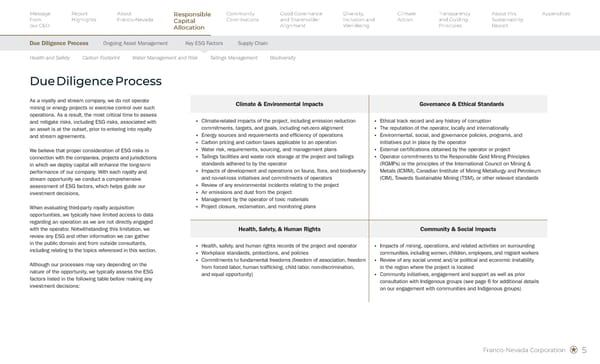Due Diligence Process
Franco-Nevada Corporation 5 Due Diligence Process As a royalty and stream company, we do not operate mining or energy projects or exercise control over such operations. As a result, the most critical time to assess and mitigate risks, including ESG risks, associated with an asset is at the outset, prior to entering into royalty and stream agreements. We believe that proper consideration of ESG risks in connection with the companies, projects and jurisdictions in which we deploy capital will enhance the long-term performance of our company. With each royalty and stream opportunity we conduct a comprehensive assessment of ESG factors, which helps guide our investment decisions. When evaluating third-party royalty acquisition opportunities, we typically have limited access to data regarding an operation as we are not directly engaged with the operator. Notwithstanding this limitation, we review any ESG and other information we can gather in the public domain and from outside consultants, including relating to the topics referenced in this section. Although our processes may vary depending on the nature of the opportunity, we typically assess the ESG factors listed in the following table before making any investment decisions: Climate & Environmental Impacts Governance & Ethical Standards § Climate-related impacts of the project, including emission reduction commitments, targets, and goals, including net-zero alignment § Energy sources and requirements and efficiency of operations § Carbon pricing and carbon taxes applicable to an operation § Water risk, requirements, sourcing, and management plans § Tailings facilities and waste rock storage at the project and tailings standards adhered to by the operator § Impacts of development and operations on fauna, flora, and biodiversity and no-net-loss initiatives and commitments of operators § Review of any environmental incidents relating to the project § Air emissions and dust from the project § Management by the operator of toxic materials § Project closure, reclamation, and monitoring plans § Ethical track record and any history of corruption § The reputation of the operator, locally and internationally § Environmental, social, and governance policies, programs, and initiatives put in place by the operator § External certifications obtained by the operator or project § Operator commitments to the Responsible Gold Mining Principles (RGMPs) or the principles of the International Council on Mining & Metals (ICMM), Canadian Institute of Mining Metallurgy and Petroleum (CIM), Towards Sustainable Mining (TSM), or other relevant standards Health, Safety, & Human Rights Community & Social Impacts § Health, safety, and human rights records of the project and operator § Workplace standards, protections, and policies § Commitments to fundamental freedoms (freedom of association, freedom from forced labor, human trafficking, child labor, non-discrimination, and equal opportunity) § Impacts of mining, operations, and related activities on surrounding communities, including women, children, employees, and migrant workers § Review of any social unrest and/or political and economic instability in the region where the project is located § Community initiatives, engagement and support as well as prior consultation with Indigenous groups (see page 6 for additional details on our engagement with communities and Indigenous groups) Message from our CEO Report Highlights About Franco-Nevada Community Contributions Good Governance and Shareholder Alignment Diversity, Inclusion and Well-Being Climate Action Transparency and Guiding Principles About this Sustainability Report Appendices Ongoing Asset Management Supply Chain Responsible Capital Allocation Key ESG Factors Health and Safety Carbon Footprint Water Management and Risk Tailings Management Biodiversity Responsible Capital Allocation Due Diligence Process
 Sustainability Report 2025 Page 6 Page 8
Sustainability Report 2025 Page 6 Page 8